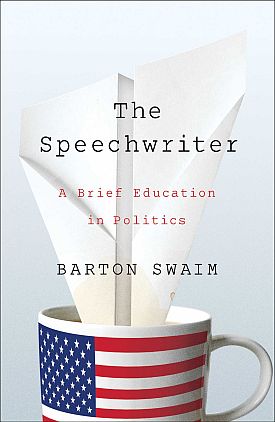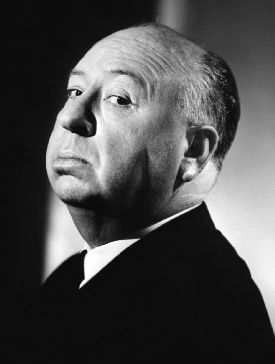Chandrology
The philosophical question confronting us today, class, is this: Is the
stupidity of the media compulsory? Now, before you answer a resounding and
optimistic “No!” let us consider, like good philosophers, all the
reasons why the answer might be yes. For if you assume, as the media do,
that the preponderance of those who read or watch the works of America’s
journalists are stupid, trivial-minded, tasteless and shamelessly addicted to
gossip, what reason could possibly persuade you not to cater to such
people? It would, of course, be possible, to produce a journalistic
oeuvre that was over the heads of the majority, but the majority would
then simply cease to attend. As it would not be practicable to pass a law
requiring people to watch the nightly news, we must make the nightly news as
attractive as possible to those whose ability to understand serious political
and international matters is — to say the least — strictly
limited.
Indeed, our devil’s advocate might continue, we find that the existing
journalistic outlets are already above the heads of most people. This we deduce
from the fact that newspaper readership is declining, as is the audience even
for classic television news, and that the only growth areas of the media are TV
shows, many on cable, and Internet sites that specialize in political and
show-biz gossip. Regrettable as the fact may be, the market (in which, after
all, everyone now believes) requires that such serious journalism as remains
must be dumbed down even further if the great American public is not to be
abandoned to a full-time and ironically appropriate diet of Get Smart
re-runs.
Some such thinking as that, at any rate, could be reasonably inferred from
the media’s treatment of the Chandra Levy story during the course of the
summer. “It’s a great story for some of the same reasons Monica was a
great story,” John Moody a Fox News vice president, told Howard Kurtz of
the Washington Post. That is, its theme was “men in power and
younger women. . . Unfortunately, it has the added suspense factor of a missing
woman, in many quarters presumed dead.” Very unfortunate indeed, you might
almost say. “Some people say we shouldn’t cover this,” Moody went
on. “It’s a slimy story. But people are fascinated by it.” There you have
it. What more is there to say?
But are people fascinated by it because the media cover it or do the media
cover it because people are fascinated by it? Perhaps we should make another
assumption than that of the audience’s incorrigible taste for such things
— namely that public taste does not lead but follows that of the
journalists and writers who make so much of lamenting the necessity to cater to
it. Could it be that stupidity in the media is the cause rather than the
consequence of stupidity in the population at large? And could we then
posit the corollary that a more intelligent coverage of the news of the day
would similarly produce intelligence in the populace at large?
The answer to such questions is not simple — to say the least. Clearly,
it must be a bit of both. When it was possible to talk meaningfully about
“decency” and “shame” in public matters, people might
have been fascinated but would have felt to a greater or lesser degree ashamed
of their fascination. Even today there is some residuum of shame in many breasts
at our Chandra-Monica obsessions — otherwise the pompous concern about the
tabloidization of the news would make no sense. Is it not, then, still possible
to nurture and develop this sense of shame by making those who wished to indulge
a salacious curiosity to go (as they used to have to do) to disreputable sources
such as gossip sheets or supermarket tabloids? Many of those who feel ashamed of
their fascination would thus be helped suppress it.
One must suppose that any such suggestion would discredit itself in the eyes
of our contemporary media culture. Self-evidently, we live in an age when
nothing is to be suppressed, especially the appetite for sex and scandal,
suppression of which is assumed to be unhealthy. It’s a known fact. But
according to polling cited by Andrew Kohut of the Pew Research Center for the
People and the Press, an interest in the TV coverage of Chandra-type stories
— examples of which are the Elián Gonzalez repatriation, the deaths
of John Kennedy Jr. and Princess Diana, the trial of O.J. Simpson and the Monica
Lewinsky scandal — seems to appeal to the same people, approximately a
third of the population, and so to have some of the qualities of an unhealthy
dependency. Shouldn’t the media, like the tobacco companies about which
they are so routinely critical, bear a heavy responsibility for their
customers’ addiction to their product?
Of course this doesn’t occur to them because they imagine that their
product is “the truth”— and you can never have too much of
that, right? This is one reason why the media pack are so insistent on
politicians’ not “lying.” The massive invasion of Gary
Condit’s privacy is justified in many minds because he “lied”
to the media in first denying an affair with Miss Levy, which was also the
excuse for the media’s pursuing its prurient interest in Bill
Clinton’s dalliance with Monica Lewinsky. Clinton’s case differed,
of course, in that he lied under oath — an oath which a foolish sexual
harassment statute he himself had signed into law gave his enemies an
opportunity to administer. But this was a legal nicety which was often forgotten
amid the promiscuous charges of “lying,” now being repeated in the
Condit case — as if lying to CNN and to a court of law were morally
equivalent.
For there is a reason why oaths are administered in court. It is not just
because they are thought to make truth-telling more likely, or lying punishable,
but also because they are an assertion of the court’s and therefore the
community’s right to ask the question in the first place. There can be no
lie where there is no obligation of faith. You might as well say that a
boxer’s or a general’s feint in attempting to deceive an opponent is
a lie. Mr. Condit owed an obligation of faith to his wife and an obligation of
honor to the police. His failure to live up to both obligations was certainly
despicable, but that did not make his lies any more the business of the media,
to whom he owed no obligation of faith. Nor did the obligation he owed to his
constituents extend to periodic updates on whom he was sleeping with.
Of course if he murdered her, there is a story, and the press is clearly
hoping that the discovery of a body will finally justify their excesses.
“Trust me; her head is in his freezer,” as another reporter told
Howard Kurtz. Well, we can certainly trust that the media — in particular
CNN and other networks for whom a long-running story like this is the very
oxygen of life–are fervently hoping it is. But even if he is guilty, he
will have been tried and convicted in the media long before there is anything
like enough evidence for a proper trial. One can look forward to an O.J.-type
trial and verdict, therefore, and yet more grist for the media’s mill. Who
can justify this?
One attempt to justify it is on the grounds that all the media attention will
help focus police energies. Without it, poor Chandra would be treated just like
any other missing person:
This sort of
leaking is part of the media orchestration that began with Levy’s parents taking
their case to television. “Are we spun? You bet,” CNN correspondent Bob Franken
said on the air, adding: “You have the spinmeister lawyers who have been hired:
Abbe Lowell, who’s very expert; Billy Martin [the Levy family attorney], who’s
very expert. They have hired public relations people to promote the story. As a
matter of fact, it is very obvious that the reason that this aunt came forward
was because she was being used as part of a coordinated media campaign, no doubt
about it.”
This, for Tunku Varadarajan of the Wall Street Journal, seems to be
enough to justify not only the outpouring of media speculation about Condit but
almost any tabloid story the press is inclined to blow up into a news-channel
bonanza. Perhaps some such idea was in Maureen Dowd’s mind when she found
a high moral purpose in the coverage, which her own paper had been
characteristically squeamish about:
This is not merely
a scintillating tabloid story. This is the stuff of great drama and novels and
journalism through the ages. It’s just as legitimate as covering the patients’
bill of rights or campaign finance, maybe more so, because here the press has a
crucial role in forcing out the truth.
This is a classic
story about whether a powerful man can put himself above the law, and about the
unappetizing inequity of relationships in Washington between older married
officials and young, needy women.
Miss Dowd’s chirpy assumption that the whole thing had been put
together as entertainment for herself was echoed by her Times op ed page
colleague, Frank Rich:
“A.I.”
tanked, “Pearl Harbor” is already history, and “Jurassic Park III” is getting
sub- two-star reviews. The nation yawned at the prospect of a man holding a
knife to a woman’s throat on “Big Brother 2,” and the hottest title that
American publishing can come up with for a beach read is “John Adams.” The Mrs.
Robert Blake mystery had no legs, and New York’s own summertime pride and joy,
the Lizzie Grubman saga, lacks two essential elements that might make it fly
west of the Hudson, sex and death.
Under these
desperate circumstances, America, summer of ’01, was fated to become Condit
Country. And what a terrific place it is.
“I love this story,” says Rich, who offers up a pro forma
disclaimer that “(1) My paramount concerns — of course — are
for Chandra Levy and for justice. (2) My secondary concern is for the Broader
Themes, which include the scandalous behavior of our public servants, the limits
of privacy and the presumption of innocence, the fate of women in the workplace,
the balance of power in the House, and the heroism of the media in selflessly
seeking out the truth. . .”
This kind of flip irony, presumably thought by the writers and their admirers
to be very sophisticated and the occasion for much exercise of wit, had its
greatest triumph three years ago when Miss Dowd all but single-handedly saved
the Clinton presidency by the brilliant stroke of seizing the occasion of the
issue of the Starr Report to review it as if it were a work of fiction. Soon
this became the official Clintonite line, and members of Congress (including
Gary Condit) who only days before had been signaling that Clinton’s goose
was cooked were suddenly inclined to criticize Starr instead, for the alleged
prurience of his interest in Clinton’s sex life. Now even Mr Varadarajan
and the great and good Florence King of National Review think it natural
to write of scandal stories as if they were entertainment rather than news.
Thus Sally Quinn in the Washington Post apostrophized the congressman:
“Don’t you realize you have cast yourself in the recurring role of every
clichéd Hollywood movie, every summer thriller?” Wow! Maybe he
should sack his agent. What was he thinking with that casting? Scott Turow, the
well-known lawyer and author of Presumed Innocent and other crime novels,
wrote in the Wall Street Journal:
To me, the most
notable thing about the wildfire attention that has befallen this case is that
the entire tale has the quality of a sequel. Whether the Condit/Levy
investigation is viewed as “Impeachment Lite” or “O.J. Goes to Congress,” the
story that the media have been telling us — and which Americans have been eager
to hear again — is by now as familiar in its elements as “Jurassic Park
III.”
Around water
coolers and Internet chat rooms, Americans amuse themselves by trying to guess
which of the surprise endings they know from novels and movies will prove out in
this case. Is it “Absolute Power” (the congressman did it) or “Presumed
Innocent” (the wife did it)? Or is it a grand new twist — a jilted Chandra
hiding in an act of revenge aimed at bringing down her congressman lover?
To his credit, Mr Turow writes to warn us that such stories, “no matter
how meaningful or important in their deeper messages about our culture, have
every appearance of having overpowered the facts.”
The willingness of
the press, especially the cable outlets, to sell us the story we want to
believe, as opposed to a dispassionate rendition of the facts, is not unique to
this case, but it remains disturbing. And so is the American inability to
distinguish the nightly news from popular narrative. What is happening here goes
well beyond where news-as-entertainment has taken us before. This is not merely
the trivial trumping the significant — Oscar- night apparel getting more
attention than a foreign plane crash that kills hundreds. In this instance, a
vital link– Mr. Condit’s role in the likely violence that befell Ms. Levy
— is simply being assumed with virtually no basis, just so the story
sells.
But now the smart set has joined the scandal-addicted mob in concluding that
an intrusive interest in other people’s lives is OK so long as we may be
entertained by it. Scandal is reality-TV for the media élite, who regard
any objection to it as merely prudish. Miss King compares those who profess a
lack of interest in Chandra and Gary to those who claim (falsely, no doubt) to
buy Playboy for the articles.
I don’t know how recently Florence King has seen a copy of
Playboy, but I can tell her that the articles, bad or boring as most of
them are, are still more interesting than the monthly parade of pneumatic
lovelies with their grotesque breast implants and their tastefully waxed
pudenda. I myself don’t buy it for either of these things but rather for
the celebrity nudes. Not only do they look (usually) more like real women and
therefore more erotic, but they are a constant reminder of what otherwise decent
people are willing to do for even the smallest corner of the blanket of
celebrity. I find the pathos of that all-consuming desire, that willing
sacrifice of reticence and modesty to a meretricious and self-destructive dream
of immortality rather an intellectual turn-on.
The fashionable view of news-as-entertainment reveals the extent to which
tabloidization is not incidental to the growth of journalistic culture and
values but of their very essence. The taste for hidden truths is justified
precisely by the fact that they are hidden. Paul Light, vice president and
director of governmental studies at the Brookings Institution, told the
Washington Post that the Condit story “has pushed the limits of
what we are willing to believe our politicians are capable of.” Not that
there has been much that we haven’t been willing to believe them capable
of for some time, at least if the popular culture — where lying, thieving,
murdering politicians are the norm rather than the exception–is anything
to go by. Anyway, it seems probable that it is the confirmation of this distrust
and not merely idle speculation about poor Chandra’s fate which is the
point of the media’s obsession with the story.
For the model of reality so enthusiastically adopted by the news media ever
since the 1960s has assumed that the bland pronouncements of officialdom are
always a mask for sordid or discreditable realities underneath — realities
which it is (not coincidentally) the quasi-constitutional function of the news
media to adumbrate. Thus it is almost necessary to assume that Condit, like
Johnson, Nixon, Reagan, Bush and Clinton before him was guilty before he said or
did anything — a fact which naturally contributed to the sensation created
by the media that his reticence about sharing with them and the world the sordid
details of his infidelities was, like more or less everything he said and did,
redolent of guilt.
Thus it was that in a Fox News call-in poll — or
“poll”— 69 per cent of those who called said Rep. Condit
somehow made Miss Levy disappear, while 14 per cent thought it was the intern
herself and 17 per cent someone else entirely. Those are the numbers that
journalists like to see, because they justify them in digging out “the
truth” — which becomes recognizable as the truth precisely because
it has to be dug out. As an ironclad, unfalsifiable guarantee of the
press’s right, even duty, to go on bulldozing the fragile lean-tos where
privacy still, here and there, manages to huddle for shelter, this kind of
assumption as to where and how truth is to be found takes a lot of beating, but
it is a result of circular reasoning.
The one honorable exception to the press’s unbridled commitment to
Chandraology was Dan Rather and “The CBS Evening News,” whose
fastidiousness briefly became almost as interesting to the rest of the media as
Chandra herself. Certainly there was a whiff of sanctimoniousness to CBS’s
high-mindedness, and Jonathan Yardley of the Washington Post was having
none of it:
The hunch here is
that CBS got beat on the story and decided that, rather than lumber in late with
yesterday’s news, it would corner the high road by going holier than thou. This
would score points with all the usual people who had commenced making all the
usual complaints about “salacious and irresponsible” journalism and thus would
enable Rather and his colleagues to get into Heaven with a wink and a nod from
Saint Peter.
This by contrast
with the rest of us lowdown newshounds, slavering away down there in the dirt
and the slime, flinging aside our “dignity” as we elbow each other in hot
pursuit of the latest juicy (and no doubt morally reprehensible) tidbit.
At least Yardley acknowledges the low-down nature of the press in pursuing
the Chandra story, though he doesn’t seem to mind it much — a breath
of fresh air when you compare his attitude with that of the designated worriers
among “media watchdogs” and professors of “journalistic
ethics” who feel constrained to justify it all in high moral terms. Mind
you, it must be a relief to someone like Lanny Davis, one of the networks’
favored “commentators,” to find himself on the other side of the
argument, where he can get that warm inner glow of self-approval for his
interest in gossip and scandal by saying that a young woman’s safety is
“more important” than Gary Condit’s privacy.
Well sure. But what wasn’t more important than Gary Condit’s
privacy? Most of the details of his affairs and his sexual behavior that
received such wide currency could have made no contribution to the effort to
find Chandra, though they were eagerly snapped up just the same, to keep the
machinery of the all-news networks humming. Even Dan Rather’s splendid
refusal came under suspicion when it began to be rumored about that it made him
the front-runner for the great “get” of the affair — an
interview with Gary Condit, which would certainly be a ratings bonanza for CBS.
The only greater one would have been a girl-to-girl sit-down, like Barbara
Walters’s with Monica, with Chandra herself. There would be ratings to
kill for! Or, indeed, to die for. But hopes for Chandra were by now beginning to
fade.
The Rather-not approach did reveal the extent to which the debasement of
public taste still crucially depends on the pack mentality of those who can
claim that they’re reluctant to pursue the story, but if they don’t
someone else will. As James Poniewozik observed in Time:
Perhaps the most
telling lesson about today’s media in Rather’s high-profile dissent is that this
sort of thing is so rare. More typically, outlets decide a story is news because
everyone else is doing it, a gentleman’s agreement that absolves any individual
of blame. Perhaps that’s why the resentment of CBS was so vehement. Critics
questioned Rather’s news sense and argued that the CBS Evening News was taking
the high road as a marketing gimmick. To some, Rather was the prude at the
bachelor party who needed to have a tequila shot and a lap dance and to stop
pretending he was better than everyone else.
Here we come to the mainspring of the scandal-machine, which is a form of
envy: the basest human impulse of the homme moyen — or a little
above the moyen — sensuel to delight in any evidence that
other people, particularly if they are in positions of authority, are no better
than he is. It has not always been so, perhaps. Only a decade or so ago, the
self-righteousness of those who clucked their tongues at Gary Hart and drove him
out of politics may have been equally unlovely, but at least it served some
social function. “Back then,” wrote Roxanne Roberts in the
Washington Post, “scandals were a kind of morality tale: When
caught, most players responded with contrition and took the consequences. Peer
and party pressure helped to quickly push resignations.”
In such cases, authority was reinforced rather than undermined. People who
did things not in keeping with the gravity of their office were forced to go.
But, Miss Roberts continues, “public tolerance for misdeeds has changed
over the years; many voters said they didn’t care much about Clinton’s private
life. More politicians refuse to bow to public or party pressure. Scandals are
less predictable and therefore more problematic for all concerned.” What
she does not say is that this change is the result of a demographic shift. The
difference between 1988 and 1998 was that by the latter date, the preponderance
of the adult electorate had grown up after, instead of before, the sexual
revolution wrought by the birth control pill in the mid-1960s. For the new
majority, casual sex was no big deal. Even most of those in monogamous
relationships had had some history of promiscuity. We were the more receptive to
the idea that “they all do it,” because we all had done it.
At any rate, it was that argument which helped to keep Clinton in power when
Gary Hart had been disgraced for a far lesser offense. It was an argument both
congenial to the media, who got and still get their bread and butter by such an
assumption, and destructive to the very principles of republican government. Not
that there is much prospect of the media’s ever bothering about
that. But it doesn’t seem too much to hope for that it might bother
some significant proportion of the rest of us enough to deprive ourselves of the
entertainment of seeing poor Mr Condit squirming on the end of the media’s
skewer.
Discover more from James Bowman
Subscribe to get the latest posts to your email.






